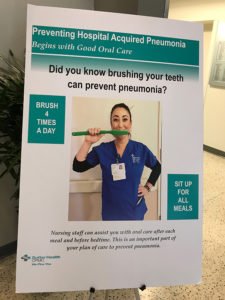Since the discovery of antibiotics, beginning with penicillin in 1928, huge strides have been made in the fight against infectious disease. However, a major consequence of modern medicine is the evolution of drug-resistant pathogens that cannot be destroyed by standard, once-effective antibiotics. These microbes are more powerful than ever before and only expected to get worse.
According to the Centers for Disease Control and Prevention, two million people are infected by antibiotic-resistant pathogens each year, and approximately 23,000 die as a result. The worst part? You’re most likely to encounter one of these superbugs in the very place you’d go to get well—the hospital.
Hospitals are turning into a breeding ground for antibiotic-resistant bacteria. In many cases, people go to the hospital sick, only to get sicker. One condition, in particular, that’s become a serious issue for hospitals is pneumonia. In fact, pneumonia—nonventilator hospital-acquired pneumonia (NV-HAP), specifically—is the number one hospital acquired infection in America.
Pneumonia is Dangerous and Expensive
Pneumonia is a scary and deadly disease. Here are some startling statistics on pneumonia in hospitals:
- Some strains of pneumonia causing bacteria are resistant to nearly all forms of antibiotics.
- Pneumonia has a 15 to 20 percent mortality rate.
- Those who catch pneumonia in the hospital have an 8.4 times higher risk of death.
- It’s not just the very young and elderly that are susceptible—people in their 40s and 50s are also getting infected.
- The cost of treating pneumonia can be up to $51,000 per person.
- In 2011, pneumonia was one of most expensive conditions treated, costing almost $10.6 billion.
As you can see, pneumonia is not to be taken lightly, but there is hope in the form of a simple and nearly cost-free remedy.
Get Dr. B’s Dental Health Tips
Free weekly dental health advice in your inbox, plus 10 Insider Secrets to Dental Care as a free download when you sign up

Toothbrushing and Flossing Lower Pneumonia Risk
In a recent Wall Street Journal article, journalists outlined how hospitals are fighting back against the onslaught of antibiotic-resistant superbugs with simple dental hygiene.
The findings that toothbrushing can help prevent illness won’t come as a surprise to regular Ask The Dentist readers. We regularly discuss how the oral microbiome is a reflection of overall health and the mouth is the gateway to the immune system.
What you might be surprised to learn, however, is just how effective brushing and flossing can be in resisting one of the most common and deadly infections in the world.
There are a number of factors that increase the risk of contracting pneumonia, many of which are characteristic of many hospital stays. These include:
- Being exposed to a pneumonia causing pathogen, such as Streptococcus pneumoniae
- Lying down for long periods of time
- Not moving around enough
- Not breathing deeply
- Taking too many antibiotics
- Not washing hands enough
- Poor dental hygiene
Recommendations for lowering pneumonia risk during a hospital visit include advice to combat all of these. Getting up regularly (if possible), moving around, and breathing deeply to better move the air in the lungs are all effective strategies for preventing this potentially deadly disease..
But nothing seems to prevent pneumonia better than toothbrushing… and flossing.
(Although there are no studies on the effects of flossing and pneumonia yet, I’m going to proactively stress the importance of flossing along with brushing, as any activity that keeps the oral microbiome balanced and free of harmful pathogens is vital and effective.)
Staying Healthy During Your Hospital Stay
Regular brushing and flossing prevents the buildup of plaque, the sticky substance that’s constantly forming on your teeth. When you allow plaque to build up in your mouth (by skipping brushing or flossing), harmful bacteria, including any that you have inhaled, are allowed to remain in your mouth where they grow and multiply.
It should come as no surprise that hospitals are teeming with airborne bacteria, and when you create a breeding ground for this bacteria by not brushing or flossing, you increase your odds of becoming infected with pneumonia while also forcing your immune system into overdrive as it works to combat all of the foreign pathogens entering your body. When your immune system remains in the ‘on’ position on a chronic basis, it causes long-term inflammation and premature aging, and you become sick more easily.
The solution is simple: When you’re in the hospital due to illness or surgery, you should brush your teeth more frequently than you would at home—just as you should wash your hands more frequently, too. By brushing your teeth and flossing three or four times a day, you prevent the proliferation of the bacteria you’re likely breathing in on a regular basis.
What Hospitals Say About Toothbrushing for Pneumonia Prevention
We could certainly use more research on toothbrushing and pneumonia prevention to better outline exactly what guidelines would be best for optimal results. But, in the meantime, some hospitals are implementing their own programs and reporting their own findings, and the numbers are staggering.
- The Department of Veteran Affairs Medical Center in Salem, Virginia, found a 92 percent decline in non-ventilator, hospital-acquired pneumonia after having patients brush twice a day.
- Sutter Medical Center in Sacramento, California, reported a 70 percent decline in pneumonia cases after having patients brush several times a day.
- New York University Langone Health in New York City started their toothbrushing program two years ago and are now having patients brush right before they go under anesthesia to prevent pneumonia.
I love these stats because they represent yet another example of the mouth-body connection. The act of toothbrushing and flossing for better oral health and infection protection is a no-brainer, and this common sense advice is turning out to be an extremely successful, low-cost solution to a dangerous and expensive problem.
 Shout out to Sutter Health for community education…I saw this recently at the hospital, where they were also doing an amazing job rehabilitation with my mom after her stroke!
Shout out to Sutter Health for community education…I saw this recently at the hospital, where they were also doing an amazing job rehabilitation with my mom after her stroke!
So next time you find yourself in the hospital, be sure to brush and floss at least three times per day. With stronger strains of pathogens on the rise, prevention is the best method for staying healthy.
Remember, what happens in your mouth, happens in your body.
Can Poor Dental Health Cause Dementia?References
https://www.cdc.gov/drugresistance/threat-report-2013/index.html
https://www.scientificamerican.com/article/hospitals-and-superbugs/
https://www.cdc.gov/hai/surveillance/index.html
https://www.ncbi.nlm.nih.gov/pubmed/29050903
https://www.cdc.gov/drugresistance/pdf/ar-threats-2013-508.pdf
https://www.ncbi.nlm.nih.gov/pubmed/27378572
https://www.ncbi.nlm.nih.gov/pubmed/27102181
https://www.ncbi.nlm.nih.gov/pmc/articles/PMC3663984/
https://www.thoracic.org/patients/patient-resources/resources/top-pneumonia-facts.pdf
https://www.wsj.com/articles/in-hospitals-pneumonia-is-a-lethal-enemy-1518868800

 The 12 Best Foods to Eat if You Have Gum Disease
The 12 Best Foods to Eat if You Have Gum Disease